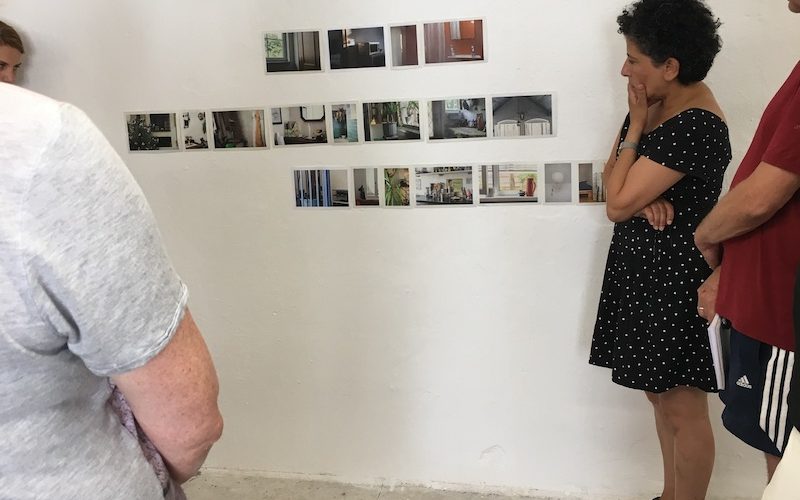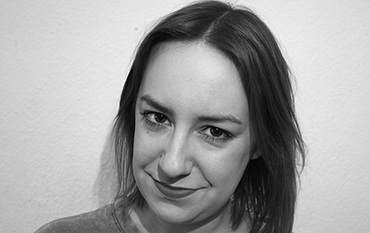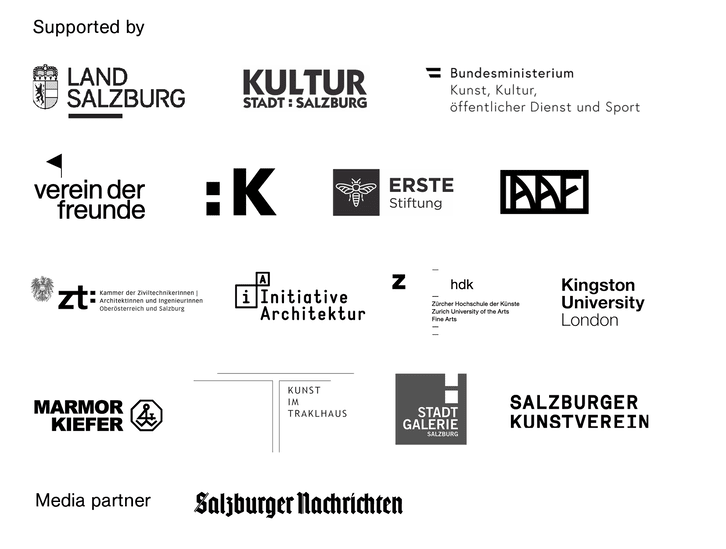| Shop |
- Academy
- Studies
- Courses
- – Courses 2024
- – All courses
- – Painting
- – Drawing
- – Printmaking
- – Photography / Film / Video
- – Sculpture
- – Installation
- – Performance
- – Architecture
- – Art Critique / Writing
- – Curating
- – Course archive 2023
- – Course archive 2022
- – Course archive 2021
- – Course archive 2020
- – Course archive 2019
- – Course archive 2018
- – Courses until 2017
- Events
- Blog/Videos
- Press

The Notion of Home
There was the sound of low voices and rustling paper as Ahlam Shibli’s students made last minute alterations to their presentations. Each student had taken over a section of the studio wall and arranged a series of photographs as if in an exhibition. With the class just over half-way through their two-week course, it was an opportunity for everyone to show how far they’d come with their projects, as well as a chance to get some feedback before they went out into Salzburg for another two days of shooting.
Ahlam asked each student to begin with a brief introduction to their project. The course’s title “The Notion of Home” acts as a touchstone for the photographers who have all interpreted it to their own ends. The first presenter, for example, was from Austria, so she decided to think about what it would mean to be a tourist in her own home, resulting in a series of self-portraits taken in popular spots for out-of-towners. Ahlam quickly zoned in on the order in which the photographs were presented; she pointed out that the works could be organised according to whether they were taken inside or outside, for instance, or whether she was sitting down or standing up. I immediately liked that Ahlam encouraged the students to find their own way, but kept bringing the awareness back to what was already there in the photographs.
Another thing I found interesting was that, as a teacher, Ahlam didn’t privilege her voice over others; she often asked the class to help her make sense of what we were looking at. But that doesn’t mean she wasn’t direct: pictures were peeled off the wall, rearranged and sometimes taken away if she felt they weren’t adding to the series. The discussion often zoomed into the more technical problems with individual photographs (too dark/out of focus) and then zoomed back out again to questions that arise from showing a series of works (how many/how to arrange them).
Other students were still conflicted with their themes, either trying to do too much or still unable to pinpoint their interests. For these people the question became: “What do you want to tell me with these photographs?” It’s a deceptively simple thing to ask, but as artists its a question should return to – whether we’re considered ‘beginners’ or ‘experts’.
***
Later, Ahlam had a conversation about her work with Grace Samboh (Ruth Noak’s co-teacher) at 5020 Galerie as part of the Summer Academy’s series of artist talks. They briefly went through Ahlam’s most recent body of work, which centres around the Palestinian city of Hebron (Al-khalil). Due to a number of Israeli settlements in the city the movements of the Palestinians is severely limited by both “physical boarders” and “perverse regulations” according to Ahlam. Her photographs depict the way in which many Palestinians have internalised some of these barriers by using the hardware of the occupation to protect their own properties. In one photograph, for instance, a family had used steel drums filled with concrete to stop their neighbours parking by their house – the same method the Israeli army use to cordon off roads. Each of the 32 photographs is accompanied by a caption in a neutral tone that details the name of the place, its significance and the date the photograph was taken. Through the talk we learnt that Ahlam has only been using captions since 2008. She changed her position after discussion with photographers such as Santu Mofokeng who lived and worked under Apartheid in South Africa.
My biggest take-away, though, was how ethical Ahlam attempts to be as a photographer. She not only goes back to show people the photographs she has taken of them, but she also shows them the other photographs so they can see what context she has put them in. If the sitters don’t like the photographs she takes them out. It reminded me of something Ahlam said earlier in class. One student wanted to photograph in a nursing home and had come up against some resistance. Ahlam had some advice for working in institutions: “Give them a present of some of the photographs you took there, so they can see what it is you’ve been doing. You don’t just do it for yourself; you do it for every photographer who comes after you.”
– CS
- 7 August 2018

Authors
- Adelaide D' Esposito
- Albatross on the fortress
- Benedikt Breinbauer
- Chloe Stead
- Collaborative lecture performance
- Everything you always wanted to know about curating
- Gaia Tovaglia
- Hildegund Amanshauser
- Hili Perlson
- Karin Buchauer
- Montage my beautiful trouble
- Nina Prader
- Olamiju Fajemisin
- Processing our days
- Recently deleted
- Summer Academy
- Tex Rubinowitz
- Writing in on and through art
List by
Internationale
Sommerakademie
für bildende Kunst
Salzburg
T +43 662 842113
| Follow us: Newsletter TikTok YouTube |
| © 2023 / Imprint / Privacy Policy |
